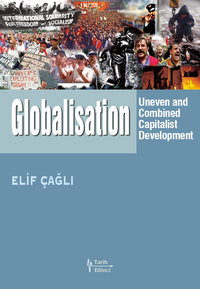The word colony in European languages means place for settling in another country in order to tie it to the metropolitan country. And Colonialism means seizing new lands, colonialist expansion. Under capitalism, colonization was realized particularly in geographical discoveries and conquest of overseas lands in the period of commercial capitalism (mercantilism) between 16th and 18th century. This expansion rose above seizure of rich raw material supplies of colonized countries and settling surplus population of metropolitan countries to these new lands.
Particularly England, which managed to establish a vast colonial empire, secured a handsome accumulation of capital with this advantageous position in the free competition period of capitalism (second half of 18th century and 19th century). She performed a leap forward in industrial production and kept the superiority in world commerce for a long time. English capitalism, with no rivals throughout that period was self-confident about her position on the world market and was preparing to develop international economic relations on a new basis dependent on industrial investment. Therefore, some of the foremost English statesmen of that era began to consider expenses for opening up new colonies as unnecessary. As Lenin pointed out, as early as 1852 Disraeli had said “colonies are mill stones hanged down our necks”.
But by the last quarter of 19th century, England began to lose her superior position. Since other European countries following the English model (particularly Germany and France), developed by building their own protective tariffs and began competing with England. However, the advantages of England’s vast colonial empire enjoyed by English capitalism were at the same time great barriers to others. When other countries began to speed up in order to catch up in this capitalist competition, the world witnessed new colonial conquests in the last quarter of 19th century. Changing conditions means changing policies. As the competition among capitalist countries for obtaining new colonies became harsher, English statesmen sought different strategies that correspond to new conditions. They got away from the overconfident state of mind in which they felt themselves as the only and absolute rulers of the world. Thus they started again to give speeches on the virtue of colonization. In this context, Cecil Rhodes’ well known words in 1895 are remarkable:
… in order to save the 40,000,000 inhabitants of the United Kingdom from a bloody civil war, we colonial statesmen must acquire new lands to settle the surplus population, to provide new markets for the goods produced in the factories and mines. The Empire, as I have always said, is a bread and butter question. If you want to avoid civil war, you must become imperialists.[1]
When colonialist rivalry escalated, cunning English statesmen expressed their wish of “acquiring new lands” “to settle surplus population”, “to provide new markets for the goods produced in the factories and mines”. Although Rhodes said “if you want to avoid a civil war, you must become imperialist”, he used the term in the sense of expanding the old style empire of United Kingdom. This ambition was nothing but an expression of the age old colonialism.
Thus, capitalist countries feverishly divided the world by obtaining new colonies, while capitalist development enforced new needs such as capital export, new investments in colonies to enlarge the market, etc. As a matter of fact the tables[2] showing the rise of colonial conquests in the last quarter of 19th century in Lenin’s book Imperialism were very concrete indicators of how world was completely divided up territorially on the basis of colonialism. Lenin said:
For the first time the world is completely divided up, so that in the future only redivision is possible, i.e., territories can only pass from one “owner” to another, instead of passing as ownerless territory to an “owner”.[3]
Colonialist expansion required seizure and colonization of new lands beyond national borders. Colonization was based on open political annexation, i.e. eliminating the oppressed nation’s right of independent political and legal existence. This way, the colonialist country gets hold of economic, political, legal, military, and every kind of executive rights on the colonized country. And that meant an absolute monopoly right of the ruling country on the ruled one. It was impossible for any other country to claim similar rights or obtain economic advantages alike on that territory unless the colony changed its master. It was through political annexation, colonization, to have rights on other countries’ economy or politics. But expansionism of capitalism would not go on in that manner forever. As capitalism developed, by nature, relationships of ruling would also have to change.
Capitalism’s progress towards monopolization caused the geographically smaller “world” dominated by commercial relations among certain regions to leap to a new and higher dimension. Imperialist stage of capitalism meant a new epoch in which industrialization rose to a tremendous level and capitalism turned into a world system literally. Relatively one dimensional commercial relationships of the former period left their place to the complex relations of monopolist powers which performed astounding leaps in capital accumulation. In order to establish new economic relations, finance capital groups from different countries needed to cross beyond borders of not only independent nation states, but also colonies belonging to this or that ruling country and to flow into new markets. Crashing down all barriers in front of it, finance capital began to flow into every area, region and country that seemed profitable. Days were gone now when only one country ruled supreme and thus the state of absolute monopoly peculiar to colonialist period was gradually disintegrating.
In imperialism period it was no more possible for a capitalist country to preserve an absolute monopoly on all investment fields of any region or country because of the high level competition among big monopolies and the complex relationship among finance capital groups. In order to outpace others in competition, capitalist countries gaining power on the basis of imperialist relations were to gain skill in trickery to weaken or eradicate the colonialist advantages of rival countries. For instance, they would go so far as to support national independence struggles in their rivals’ colonies while continuing to claim their rights in their own colonies. In fact, it is no wonder they did that, unless it did constitute a threat for the capitalist system –that is, unless national struggles in colonial countries developed towards a workers’ uprising. They were confident that a country liberated from the colonial statute and formed its nation-state had to knock on their door when it comes to building the economy.
Of course these kinds of transformations cannot occur overnight, which is the dialectics of every transformation. Those colonialist countries standing on the advantages of the colonialist period in search of getting a powerful position on the basis of imperialist expansionism never willingly give up their advantageous position. However, no one can resist the main direction of progress in the long run. And laws of dialectics worked in the transition period from colonialism to imperialism through numerous structural turbulences and national uprisings in colonial countries.
link: Elif Çağlı, Colonialist expansion and change, August 2002, https://enternasyonalizm.org/node/585






